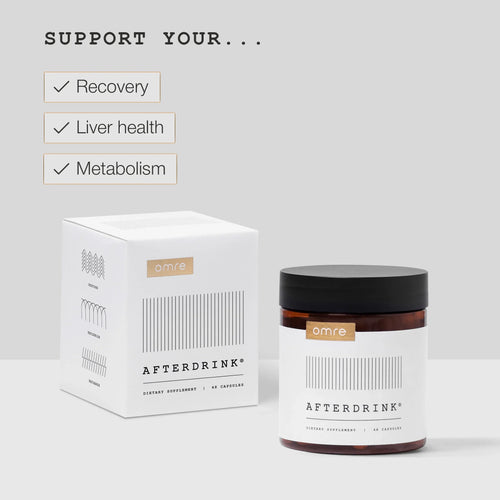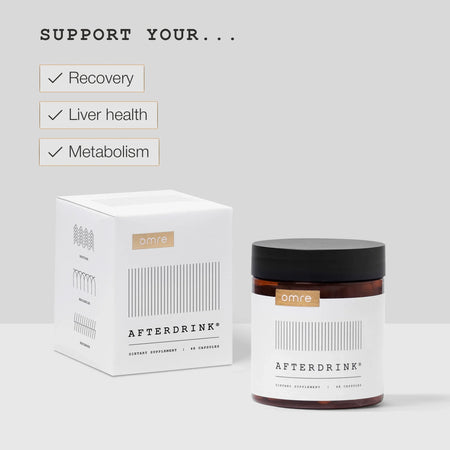Table of Contents
Is Kombucha good for hangovers? If you're asking this question, chances are you've tried a few hangover cures that haven't worked and are wondering if Kombucha is the answer.
Kombucha is a traditional Asian tea with many health benefits. Some even recommend it as a hangover cure after a big night out.
But is Kombucha good for hangovers?
In this article, we'll examine the health benefits of kombucha tea and whether it can help reduce hangover symptoms.
AFTERDRINK®
A supercharged antioxidant designed to support recovery, made from the very best, research-backed ingredients on the market.*
WHAT IS KOMBUCHA?
Kombucha has been used for centuries in Asia and is made by adding strains of yeast and bacteria to black or green tea.
Adding the bacteria and yeast kickstarts the fermentation process, which produces acetic acid (what vinegar is made of) and tiny amounts of alcohol.
The drink is then filtered, leaving behind the by-products of the fermentation process, which are perceived to have positive health benefits.
In summary, Kombucha is fermented tea!
Next, we'll examine the reported health benefits and whether they can be helpful for hangovers.
KOMBUCHA HEALTH BENEFITS
A quick search online will tell you that Kombucha is a probiotic and antioxidant that can even kill bacteria!
Can Kombucha have such powerful health effects?
Let's dig deeper into the claims next.
ANTIOXIDANT
The antioxidant properties of Kombucha mainly come from its origin as a tea. For example, green tea is known to have high concentrations of antioxidants known as polyphenols. Polyphenols are naturally occurring substances that neutralize free radicals. These antioxidants may assist in detoxifying your liver and reducing the harmful effects of free radicals that alcohol consumption produces, which can help with hangover recovery.
PROBIOTIC
Kombucha is made by adding bacteria to tea. Therefore, because the drink contains bacteria, it is known as a probiotic. While the probiotic action of Kombucha has not yet been proven, probiotics themselves are essential for maintaining vital gut health and reducing inflammation. Calming your digestive system could help alleviate hangover-related symptoms like stomach aches and nausea.
ANTIMICROBIAL
Acetic acid is one of the by-products formed when Kombucha is produced. It is essentially vinegar, which has mild antibacterial properties. (Apple cider vinegar is another popular hangover cure, but it is just acetic acid. You can read more about this here.)
A study showed that Kombucha killed certain types of bacteria when put alongside one another in a petri dish. However, given that Kombucha contains acetic acid, this is to be expected. Still, it does not mean it has antimicrobial properties when ingested. (1)
Little evidence exists for Kombucha's natural health benefits. It has only been studied in one human trial (2). Therefore, any health claims should be taken with a pinch of salt.
ELECTROLYTE REPLENISHMENT
Kombucha contains natural electrolytes crucial for rehydrating your body. Replenishing these electrolytes can help alleviate dehydration-related hangover symptoms such as headaches, making Kombucha a potentially beneficial option when you're dealing with a hangover.
Also, unlike many electrolyte-rich sports drinks, Kombucha is low in sugar, making it a healthier alternative for hydration without the adverse effects of added sugars.
HOME-BREWED VS. STORE-BOUGHT KOMBUCHA
Home-brewed Kombucha generally contains more beneficial strains of bacteria and yeast, potentially more effective in providing hangover relief than some store-bought versions, which could be pasteurized and contain added sugars. If you're looking for the most potent benefits, home-brewed Kombucha might be the way to go.
So, with the basics about Kombucha, let's take a closer look at whether it's good to drink for hangovers.
IS KOMBUCHA GOOD FOR HANGOVERS?
Kombucha is not a proven remedy for hangovers. While it offers hydration and contains small amounts of nutrients, it does not directly address the root causes of hangovers, such as dehydration, inflammation, or poor sleep quality.
While Kombucha may seem like a healthy choice, understanding how alcohol affects your body can help clarify whether it truly helps with hangovers. Let’s break it down.
Dehydration: Alcohol is a diuretic. That means it makes your kidneys flush out water, dehydrating you.
Inflammation: When alcohol is broken down in your liver, toxic by-products such as acetaldehyde are formed. These are highly volatile and react with your cells, causing inflammation.
Poor Sleep Quality: Alcohol blocks your brain from reaching the REM stage of sleep. This is the deepest stage of sleep and is essential for waking up feeling fully rested. That's why sleep quality is never as good after a few drinks compared to being sober.
Kombucha is fermented tea. While it may be argued that it contains more nutrients than regular tea, the difference is negligible overall.
It can provide hydration, but it’s unlikely to significantly help with the systemic effects of a hangover, such as inflammation or poor sleep quality.
Therefore, it's doubtful that there is any other benefit to a hangover beyond minor hydration.
IS KOMBUCHA A HANGOVER CURE?
No, Kombucha is not a hangover cure. While it may provide some hydration and nutrients, it does not address the root causes of hangovers, such as dehydration, inflammation, or poor sleep quality.
AFTERDRINK®
A supercharged antioxidant designed to support recovery, made from the very best, research-backed ingredients on the market.*
IMPACT ON HEADACHES AND MIGRAINES
Studies suggest Kombucha's probiotic content may help reduce the frequency and severity of headaches, migraines, and common hangover symptoms by promoting better gut health. So, while Kombucha isn't a cure-all, its positive effects on the gut could provide some relief.
CAN KOMBUCHA MAKE HANGOVERS WORSE?
If you're considering trying Kombucha as a hangover remedy, there are a few potential negatives to be aware of.
The most common side effects include abdominal discomfort, bloating, and diarrhea. The acidity and high sugar levels of some kombucha brands can be unsettling.
Kombucha is made from fermented green tea, which naturally contains caffeine. Caffeine is a stimulant that can make you feel more on edge and shaky, so it may not be the best drink to have when hungover. You can read more about this in our article about caffeine for hangovers.
ANYTHING ELSE TO CONSIDER?
Hangovers are a sign from your body that you've been drinking too much alcohol for it to handle. Trying to "cure" a hangover by drinking Kombucha is not the best approach.
PREVENTATIVE MEASURES
One way to consume Kombucha as a preventative measure against hangovers is to consider opting for kombucha mocktails instead of alcohol or consuming it alongside alcoholic drinks. This way, you might reduce the severity of your hangover symptoms the next day.
Prevention is always better than cure. Drinking plenty of water on your night out, having a meal before going out, and sticking to lighter-colored drinks will go a long way toward preventing the worst hangovers.
In addition, you may want to consider sticking to lighter-colored alcoholic drinks that contain a lower concentration of congeners. That's because congeners have been shown to make hangovers more severe.
KOMBUCHA MOCKTAILS
Incorporating Kombucha into mocktails, such as a spritz or a Kombucha sangria, can provide festive, non-alcoholic alternatives that help reduce the likelihood of hangovers. These drinks can be a fun and healthy way to enjoy your evening without the harsh aftereffects of alcohol.
KOMBUCHA FOR HANGOVERS – FINAL VERDICT
That concludes our investigation into Kombucha for hangovers. Although it is marketed as a health drink, there is little evidence of any benefits.
When it comes to hangovers, Kombucha is unlikely to be particularly beneficial. It's just fermented tea!
With that said, other hangover teas could be more helpful, like ginger tea. You can read more about this in our article about the best teas for a hangover.





